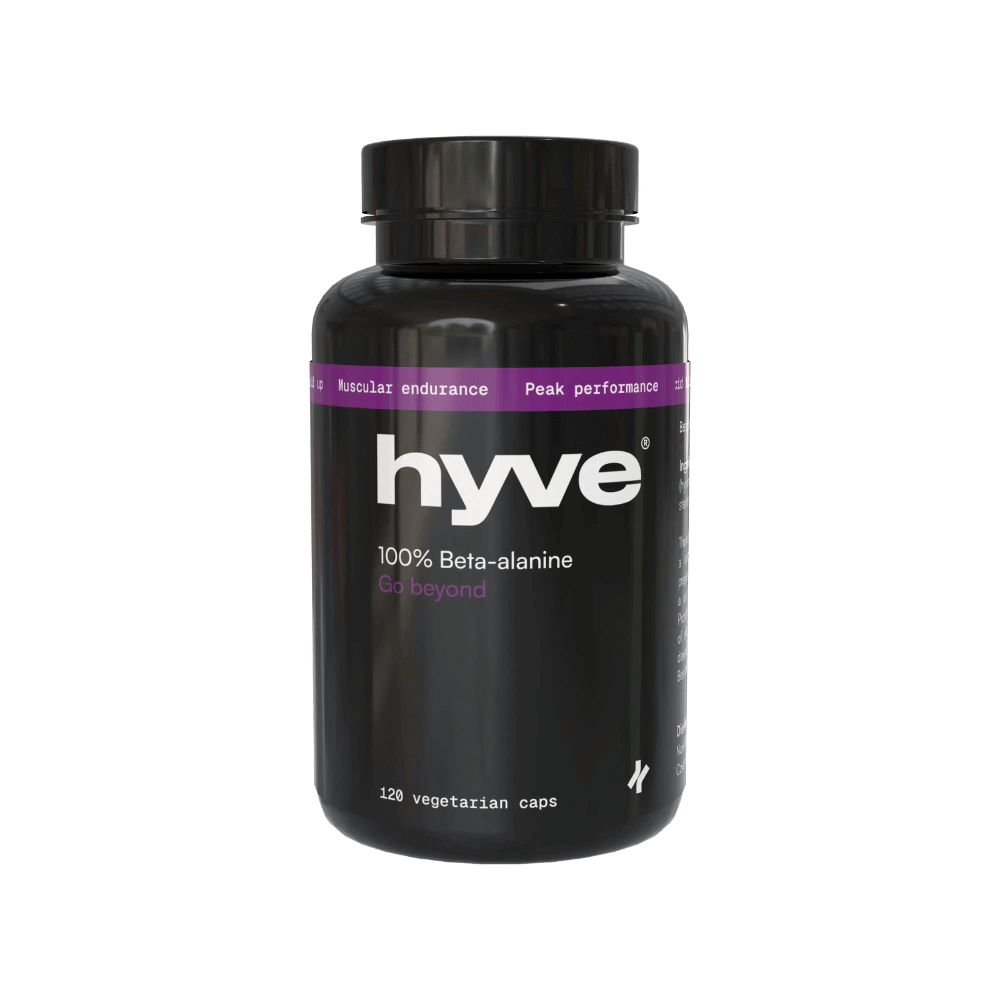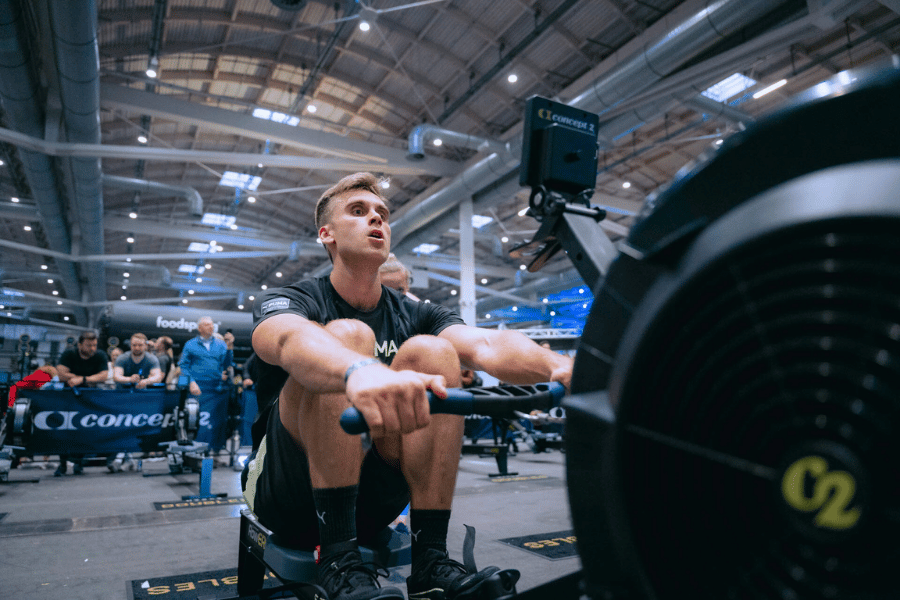
Performance Maximization
Delay Muscle Fatigue
Capsules
11-40
During day
100% Beta-alanine
Delaying muscle fatigue, 120 capsules
Product description
Eliminate muscle fatigue and get more out of your workout hyve Beta-alanine is a key amino acid that supports the synthesis of carnosine - one of the most important substances for regulating pH in muscles. Due to its effect on muscular endurance, performance and regeneration, it is an ideal choice for athletes who perform repeated intense performances and want to push their limits.
Recommended use
Composition
Other
A suitable combination
Order by 6:00 PM - delivery tomorrow
Payment by Apple pay, Google pay and card
Satisfaction guarantee
Performance Maximization
Delay Muscle Fatigue
Capsules
11-40
During day

100% Beta-alanine
Increase your performance during intense exercise
hyve Beta-alanine is a dietary supplement for endurance and strength athletes. It increases carnosine levels in the muscles and helps delay muscle fatigue during intense exercise.
Longer endurance at pace
Beta-alanine increases the level of carnosine in the muscles, which helps neutralize the acidic environment and delay fatigue during intense exercise.
For strength, endurance and HIIT activities
Beta-alanine helps you handle short, intense bursts of strength training, intervals, and final sprints – an ideal choice for runners, cyclists, and HIIT enthusiasts.
Scientifically proven effect
The effectiveness of beta-alanine is confirmed by dozens of studies - regular use has been shown to improve performance in both trained and recreational athletes.

Do more, without burning your muscles
Beta-alanine increases muscle carnosine levels, which helps neutralize the acidic environment created during intense exercise. This delays the onset of fatigue and allows you to maintain a higher intensity for longer - ideal for sprints, intervals and strength training where the last reps are crucial.
Build an advantage with every dose
Beta-alanine’s effects don’t come immediately – they build up gradually, providing a steady advantage in training and competition. Regular use increases muscle carnosine stores, allowing you to handle higher intensity, more reps, and shorter rest periods between intervals. It’s not a one-time miracle, but a smart strategy to push the fatigue threshold and gain an edge where it matters most.

100% beta-alanine
Beta-alanine is a precursor to carnosine, which acts as a hydrogen ion (H⁺) buffer in muscles. Its supplementation increases the content of carnosine in muscles, thereby improving buffering capacity and delaying muscle fatigue during intense physical exertion lasting 30 seconds to 10 minutes.
Further information
Backed by studies. Proven under maximum load.
hyve Beta-Alanine is not just another supplement on the market. It is a performance cornerstone for athletes looking to push their limits with scientifically proven support for muscular endurance.
Increase muscle carnosine for better buffering capacity
Long-term beta-alanine supplementation increases muscle carnosine levels by up to 80%, improving the ability to buffer hydrogen ions (H⁺) produced during intense exercise. This mechanism helps slow the drop in muscle pH, delaying the onset of fatigue, and allowing high intensity exercise to be maintained for longer periods of time.
Beta-alanine is particularly suitable for performances lasting 30 seconds to 10 minutes - for example, interval training, sprints, HIIT, rowing, 400-1500 m runs or intense cycling sections.
Efficiency under load: 30 seconds to 10 minutes
Beta-alanine has been shown to be most beneficial during 30 seconds to 10 minutes of exercise, when hydrogen ion production is significant. In this range of performance, muscle acidosis plays a key role in the onset of fatigue – and this is where beta-alanine can make a significant contribution to performance.
The effect has been confirmed in sprinters, rowers, cyclists and endurance athletes during repeated intense exercise – for example, in final sprints, on climbs or in sections at race pace.
Use in training and racing
Beta-alanine can be used not only to improve performance in competitive conditions, but also as an ergogenic tool in training. Studies show that its use can increase the volume and quality of high-intensity training, improve lactate tolerance, and support adaptation to exercise.
This can be particularly beneficial in the preparation period or during interval blocks where the goal is to increase resistance to metabolic stress.
The effect of beta-alanine depends on regular dosing
Beta-alanine does not have an acute effect, but works by gradually saturating muscle cells. To increase carnosine levels, daily supplementation is required for at least 4 weeks.
The optimal daily dose is between 3.2–6.4 g and should be divided into several smaller doses to avoid paresthesia (temporary tingling). Full muscle saturation usually occurs between weeks 8–10 and remains elevated for several weeks after discontinuation.
Frequently asked questions
Get the most out of the product
What is beta-alanine used for?
Beta-alanine is a precursor to carnosine, a substance that acts as a buffer in muscles and helps neutralize hydrogen ions (H⁺) that are produced during intense exercise. This delays muscle acidification and extends the time for which high intensity exercise can be maintained.
Frequently asked question is beta-alanine suitable?
It is most effective for sports performances lasting 30 seconds to 10 minutes, such as 400-1500 m running, rowing, swimming, cycling sprints, CrossFit, HIIT or strength training with short breaks. It is also suitable for endurance athletes with intense sections during the performance - for example, during hill runs or final sprints.
Although beta-alanine is not primarily intended for purely aerobic exercise (e.g., steady marathon running), it can be very useful for hill runs, sprints, final acceleration, or interval training. It is at these moments that the production of hydrogen ions increases, and beta-alanine helps to delay their negative effects on muscle work. This allows you to maintain the pace during the crucial phases of a race or training session.
Does beta-alanine also help strength athletes?
Yes! Beta-alanine can improve performance during multiple repetitions of submaximal exercise by delaying the onset of muscle fatigue caused by acidosis. It is suitable for bodybuilding, functional strength training, high-volume powerlifting or circuit training.
How is beta-alanine dosed?
The recommended daily dose is 3.2–6.4 g per day , divided into smaller doses (e.g. 0.8–1.6 g every 3–4 hours). Long-term use (at least 4 weeks) is necessary to effectively increase carnosine levels in muscles. The effect persists for several weeks after discontinuation.
How long will it take for me to notice the effects?
The effects are not immediate – beta-alanine is not a stimulant. The first results can be expected after 2–4 weeks of supplementation, with full effect usually achieved after 8–10 weeks of regular use.
Is beta-alanine safe?
Yes. Beta-alanine is safe for healthy individuals at doses up to 6.4 g/day for up to 24 weeks (Dolan et al., 2019). The most common side effect is paresthesia (tingling of the skin), which is temporary.
Can beta-alanine be combined with creatine or caffeine?
Yes! The combination of beta-alanine with creatine is common and can have a synergistic effect – beta-alanine delays fatigue, creatine increases explosive power. It also goes well with caffeine, especially on training days. Beta-alanine does not contain stimulants and therefore does not disrupt the nervous system.
Is beta-alanine suitable for women?
Yes! Women generally have lower levels of carnosine in their muscles than men, and therefore may benefit even more from beta-alanine supplementation.
Can vegetarians and vegans take beta-alanine?
Yes! Beta-alanine is commonly found in meat, which is why vegetarians have lower baseline carnosine levels. Supplementation is especially effective for them because the difference between baseline and target levels is greater.
How does science confirm the effects of beta-alanine?
Beta-alanine, buffering capacity and athletic performance
- Harris RC, Tallon MJ, Dunnett M, et al. The absorption of orally supplied beta-alanine and its effect on muscle carnosine synthesis in human vastus lateralis. Amino Acids. 2006;30(3):279–289. doi:10.1007/s00726-006-0299-9.
- Saunders B, Elliott-Sale K, Artioli GG, et al. β-alanine supplementation to improve exercise capacity and performance: a systematic review and meta-analysis. Br J Sports Med. 2017;51(8):658–669. doi:10.1136/bjsports-2016-096396.
- Dolan E, Swinton PA, Pain MTG, et al. A systematic risk assessment and meta-analysis on the use of oral β-alanine supplementation. Adv Nutr. 2019;10(3):452–463. doi:10.1093/advances/nmy115.
- Trexler ET, Smith-Ryan AE, Stout JR, et al. International society of sports nutrition position stand: Beta-alanine. J Int Soc Sports Nutr. 2015; 12:30 p.m. doi:10.1186/s12970-015-0090-y.
- Derave W, Özdemir MS, Harris RC, et al. β-Alanine supplementation augments muscle carnosine content and attenuates fatigue during repeated isokinetic contraction bouts in trained sprinters. J Appl Physiol. 2007;103(5):1736–1743. doi:10.1152/japplephysiol.00397.2007.
- Van Thienen R, Van Proeyen K, Vanden Eynde B, et al. Beta-alanine improves sprint performance at the end of an exhaustive endurance exercise. Med Sci Sports Exerc. 2009;41(4):898–903. doi:10.1249/MSS.0b013e31818db708.
- Bellinger PM, Minahan CL. Performance benefits from β-alanine supplementation in elite cyclists. Med Sci Sports Exerc. 2016;48(5):933–941. doi:10.1249/MSS.0000000000000845.
- Milioni F, Grgic J, De Andrade Nemezio KM, et al. Effects of β-alanine supplementation on physical performance in elite female soccer players. Science Sports. 2019;34(3):179–185. doi:10.1016/j.scispo.2018.11.006.